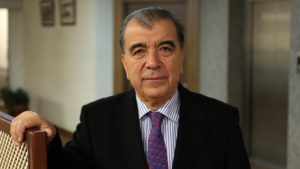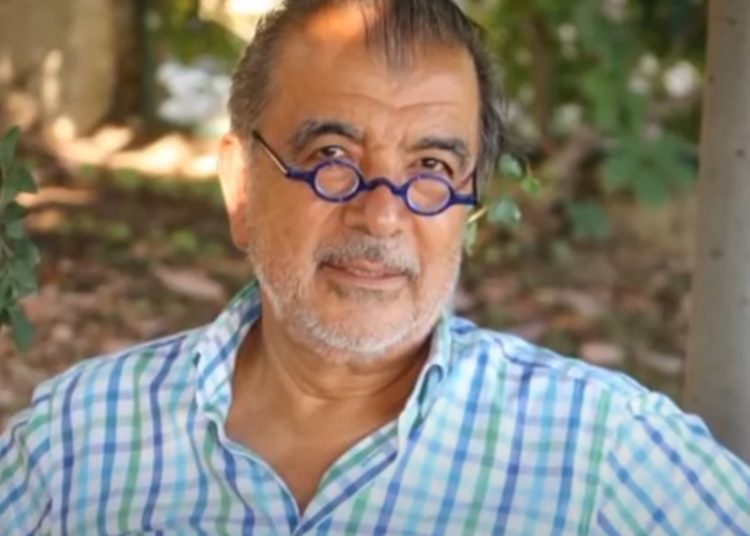Abdullah Bozkurt/Stockholm
A Turkish prosecutor described the advocacy of Turkey’s alliance with the United States and Israel as criminal evidence in an indictment filed against a former intelligence officer.
In an indictment submitted to a high criminal court in Ankara on January 16, 2020, prosecutor Muhammet Ali Korkmaz cited a document which endorsed the view that Turkey, the US and Israel should have an alliance in pursuing their common interests as evidence of a crime.
The document, written by Enver Altaylı, a veteran intelligence officer who had worked for Turkey’s National Intelligence Organization (MİT) in the ’60s and ’70s, featured his profile in English.
“Enver Altaylı believes in Turkish, American and Israeli friendship. In my opinion, the interests of these parties do not conflict, and Turkey’s geopolitics necessitates cooperation with America and Israel,” Altaylı said about himself in a document that was stored on his MacBook. The document is believed to be part of an upcoming book and was aimed at introducing his readers to his views.
The prosecutor incorporated the Turkish translation of the document into the indictment in a bid to build an espionage case against the former intelligence officer. Although there is no evidence suggesting that Altaylı had in fact worked for a foreign government, the prosecutor listed his trips to the US and Europe as additional criminal evidence to back up what appears to be completely baseless charges.
Seventy-eight-year-old Altaylı not only worked for intelligence but also served as advisor to former Turkish prime ministers Turgut Özal and Süleyman Demirel and played an important role in shaping Turkey’s foreign policy with respect to Russia and Central Asia in the aftermath of the collapse of the Soviet Union.
He had spent some time in Germany in the 1980s after leaving the agency and acquired German citizenship as well. He had been working on a book when he was arrested in Turkey.
Section of the indictment that shows the prosecutor cites Altaylı’s view supporting Turkey’s alliance with the United States and Israel as criminal evidence:
Altaylı was arrested in 2017 for alleged membership in the Gülen movement, a group critical of President Recep Tayyip Erdoğan. He was charged with “political and military” espionage as well. At the end of the trial in November 2021, he was handed down a prison sentence of 23 years, four months.
The court did not question the prosecutor’s assertion that endorsing Turkey’s friendship with the US and indicated its agreement in its verdict after sham trial hearings during which Altaylı was deprived of his right to present an effective defense as well as his right to a fair trial.
The Turkish judiciary has become a political tool in the hands of Erdoğan and his neo-nationalist partners, especially after a wave of purges of prosecutors and judges that started in 2015 and accelerated in 2016. Almost 30 percent of all judges and prosecutors were removed without any judicial or administrative investigations and were replaced with partisans and loyalists whose mandate was to carry out the government’s wishes.
Korkmaz, who indicted Altaylı, was one of these loyalists who had investigated cases that involved critics of the president and his associates.
Altaylı believes he was targeted by the government, especially by a pro-Russian, neo-nationalist group that is aligned with President Erdoğan because he took a stance against the Federal Security Service of the Russian Federation (FSB), formerly known as the KGB. According to Altaylı, forces and individuals close to Russia in Turkey tried to silence him by throwing him in prison, and the defamation and negative publications about him, especially in pro-government publications, should be evaluated within this framework.

Through his Twitter account, which appears to be managed by his family or his lawyer, Altaylı argued he was one of the few people who could accurately explain the Russian threat to Turkish state officials and the steps that needed to be taken. He warned those officials that the biggest threat to Turkey could be a Russia with imperial goals, and he argued Turkey should make its security, energy and foreign policy decisions accordingly. He attributed the negative views of the Turkish public towards the West and NATO during the Russian-Ukrainian war to intelligence activities by the FSB, which expended a significant amount of money to build a pro-Russia and anti-West Turkey.
“Many journalists are paid with these funds for their propaganda in favor of Russia no matter what,” he claimed.
“You may have read that according to recent surveys, almost half the Turkish public thinks Russia is not responsible for the bloodshed in Ukraine. This situation proves one thing: This Russian intelligence fund is managed very successfully in Turkey. Whoever administers the Turkish part of this fund should be given a medal by Russia!” he wrote.
Indeed, according to a survey conducted in June by the Ankara-based Metropoll company that Altaylı mentions, some 48 percent of Turks hold the United States and NATO, of which Turkey has been a member since 1952, responsible for the Russian invasion of Ukraine, while only 34 percent think Russia is responsible for it.
The first page of the indictment against Altaylı shows Turkish intelligence agency MIT listed as a plaintiff, meaning it apparently filed a complaint against Altaylı:
When participants were asked, “Who do you hold responsible for the invasion of Ukraine?” 48.3 percent said they hold the US and NATO responsible, while 33.7 percent said it was Russia and 7.5 percent said it was Ukraine that was responsible for the Russian invasion, which began on Feb. 24, sparking international condemnation and sanctions against Russia.
Nordic Monitor previously published an intelligence report issued by the FSB that was found on Altaylı’s phone revealing Russian plans and strategies after the downing of one of its warplanes by Turkey in 2015. According to the report, in addition to a number of political and military suggestions for the authorities, Russian intelligence decided to follow Turkish President Erdoğan’s family members more closely.
Stating at a September 2021 hearing in his trial that he had met with then-prime minister Ahmet Davutoğlu’s chief advisor Feridun Bilgin to deliver the report to Davutoğlu, Altaylı claimed he could not be accused of espionage and that such a trial could only be launched by Russian Federation prosecutors.
Altaylı also stated that the Russian intelligence report on his phone was included in the indictment as if it were his own report and that he was accused of having devised the plans in the report himself, claiming the report was put in the judicial file and deciphered by the prosecution and that that was a crime. He also said that by disclosing the report, the Russians were informed of secret information in the hands of the Turkish state.
“The prosecution that is accusing me of espionage is actually sharing secret state information with the Russians,” he added.
The report, which was drafted by Igor Gennadyevich Sirotkin, deputy director of the FSB, on December 8, 2015, two weeks after the downing of the Russian warplane on the Turkish-Syrian border, suggested a comprehensive series of military and political steps to be taken against Turkey. A variety of suggestions were offered, from putting the Turkish army in a difficult situation in Syria and ensuring a new refugee influx to Turkey to Russian agents in Turkish institutions engaging in disinformation activities.
The intelligence report, which was submitted to FSB Director Alexander Vasilyevich Bortnikovwhich, also included recommendations that would put Erdoğan’s ruling party in a difficult situation with the Turkish public and dedicated a section to members of the Erdoğan family who were accused of engaging in the oil trade with the Islamic State in Iraq and Syria (ISIS).












